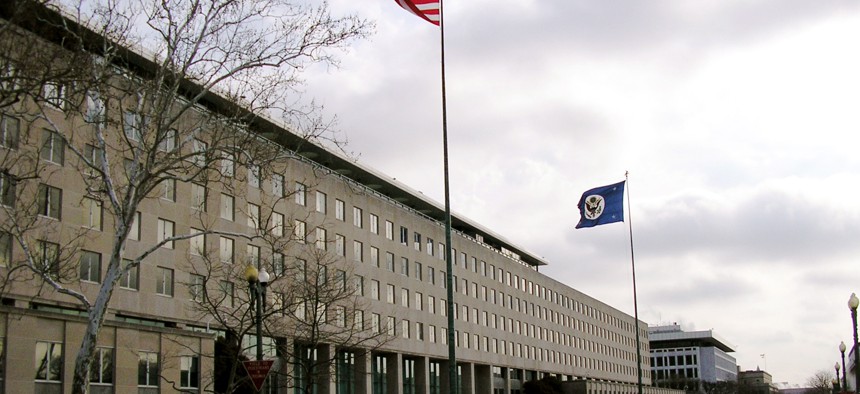
The Harry S Truman Building, Headquarters of the State Department By Loren (Own work) [Public domain], via Wikimedia Commons
Getting the State Department Ready for Prime Time
The end of an era of war in Iraq and Afghanistan suggests a larger role for the State Department in foreign policy formulation, but is it prepared to step up?
When it comes to the formulation and conduct of U.S. foreign policy, the Department of State is the federal government’s nominal lead agency. It’s mission is nothing short of shaping and sustaining a “peaceful, prosperous, just and democratic world” according to the recent State-USAID Joint Strategic Plan. But in many ways, State has played second fiddle to the Department of Defense as overseas military operations in Iraq and Afghanistan dominated foreign policy priorities.
Officials in both the Departments of State and Defense have recognized this imbalance. In 2008, then Secretary of Defense Robert Gates warned of the “creeping militarization” of U.S. foreign policy as a result of the War on Terror. During her 2009 nomination hearing, former Secretary of State Hillary Clinton further cautioned that “the disparity of resources is such that when you've got more than 10 times the resources going to the Defense Department, than you have going to the State Department and foreign aid, the Defense Department has been, in effect, recreating mini State Departments.”
Now, as the military ends an era of large-scale warfare in Iraq and Afghanistan and the U.S. pivots to face a broader spectrum of global challenges, there is renewed focus on the appropriate interagency balance in conducting foreign policy. In a speech to West Point graduates in May, President Obama asserted that “military action cannot be the only -- or even primary -- component of our leadership in every instance. Just because we have the best hammer does not mean that every problem is a nail.” Secretary of Defense Hagel couldn’t agree more. Speaking at Defense One Summit in November 2013, he insisted that the military is “but a tool, but a part of foreign policy, recognizing that our main responsibility is the security of this country.” In short, the civilian elements of government, and in particular the State Department, should play a larger role in the development and execution of U.S. foreign policy.
But the State Department may need to undergo reforms to enhance its ability to take greater responsibility for U.S. foreign policy. As the Foreign Service celebrates its 90th anniversary this year, Foreign Service Officers and institutions dedicated to U.S. diplomacy have reflected on areas where the Department can improve. Three in particular stand out.
- Unify the Foreign and Civil Services - State has two parallel but distinct personnel systems. The Foreign Service has a rigorous entry-standard, a military-style up-or-out promotion and rank-in-person system, and requires officers to serve abroad for most of their careers. State’s Civil Service has no common entry-standard, no up-or-out evaluation, a rank-in-position system, and does not require its personnel to serve abroad. This dual-system has been a source of disharmony and conflict within the Department. Among others, the Association for Diplomatic Studies and Training calls for a single, unified diplomatic service to take on 21st century foreign policy challenges.
- Enhance professional education and training - Aside from initial A-100 classes for new Foreign Service Officers, language courses, and consular training, significant professional education is lacking for U.S. diplomats. The overall training paradigm could be summarized as “sink or swim.” Improving and institutionalizing professional education is one of the American Foreign Service Association’s top recommendations for the Department’s 2014 Quadrennial Diplomacy and Development Review. AFSA concludes, “what the Foreign Service lacks, and what would make it a much more professional, effective career path, is an institutionalized professional education and training continuum that expands beyond random, just-in-time, short term skills training.”
- Place greater restrictions on political nominees - President Obama has increased the percentage of ambassador nominations allotted to political allies. Traditionally, presidents have reserved just 30% of posts for political nominees, whereas Obama has raised this figure to 37%. Several of these appointees were political campaign bundlers for Obama (25 of 132 according to AFSA) and some have made their lack of international experience and familiarity with their assigned country painfully clear. But the increase in political appointees extends beyond high-level ambassadors and positions in the Secretary of State’s office and deep into the bureaucracy. While many political appointees are qualified and highly capable, the decline in career diplomat representation in senior State positions augurs poorly for American diplomacy.
To face the global challenges the 21st century presents, the president and leaders of key departments and agencies have indicated the U.S. needs a ‘whole-of-government’ approach to foreign policy-making that places a greater emphasis on civilian power. For the State Department, this suggests a more authoritative role in the foreign policy process than it has had in recent years. To successfully meet the demands of such a role, however, State needs to reassess its personnel system and how it prepares diplomats to serve U.S. interests abroad.
This post is written by Government Business Council; it is not written by and does not necessarily reflect the views of Government Executive Media Group's editorial staff. For more information, see our advertising guidelines.



